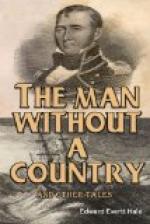Paul free! The old had faced the new. Each had named its champion. And the new conquers!
THE DOT AND LINE ALPHABET.
[This sketch was originally published in the Atlantic Monthly for October, 1858, just at the time that the first Atlantic Cable, whose first prattle had been welcomed by the acclamations of a continent, gasped its last under the manipulations of De Sauty. It has since been copied by Mr. Prescott in his valuable hand-book of the electric telegraph.
The war, which has taught us all so much, has given a brilliant illustration of the dot and line alphabet, wholly apart from the electric use of it, which will undoubtedly be often repeated. In the movements of our troops under General Foster in North Carolina, Dr. J.B. Upham of Boston, the distinguished medical director in that department, equally distinguished for the success with which he has led forward the musical education of New England, trained a corps of buglers to converse with each other by long and short bugle-notes, and thus to carry information with literal accuracy from point to point at any distance within which the tones of a bugle could be heard. It will readily be seen that there are many occasions in military affairs when such means of conversation might prove of inestimable value. Mr. Tuttle, the astronomer, on duty in the same campaign, made a similar arrangement with long and short flashes of light.]
* * * * *
Just in the triumph week of that Great Telegraph which takes its name from the Atlantic Monthly, I read in the September number of that journal the revelations of an observer who was surprised to find that he had the power of reading, as they run, the revelations of the wire. I had the hope that he was about to explain to the public the more general use of this instrument,—which, with a stupid fatuity, the public has as yet failed to grasp. Because its signals have been first applied by means of electro-magnetism, and afterwards by means of the chemical power of electricity, the many-headed people refuses to avail itself, as it might do very easily, of the same signals for the simpler transmission of intelligence, whatever the power employed.
The great invention of Mr. Morse is his register and alphabet. He himself eagerly disclaims any pretension to the original conception of the use of electricity as an errand-boy. Hundreds of people had thought of that and suggested it: but Morse was the first to give the errand-boy such a written message, that he could not lose it on the way, nor mistake it when he arrived. The public, eager to thank Morse, as he deserves, thanks him for something he did not invent. For this he probably cares very little; nor do I care more. But the public does not thank him for what he did originate,—this invaluable and simple alphabet. Now, as I use it myself in every detail of life, and see every hour how the public might use it, if it chose, I am really sorry for this negligence,—both on the score of his fame, and of general convenience.




